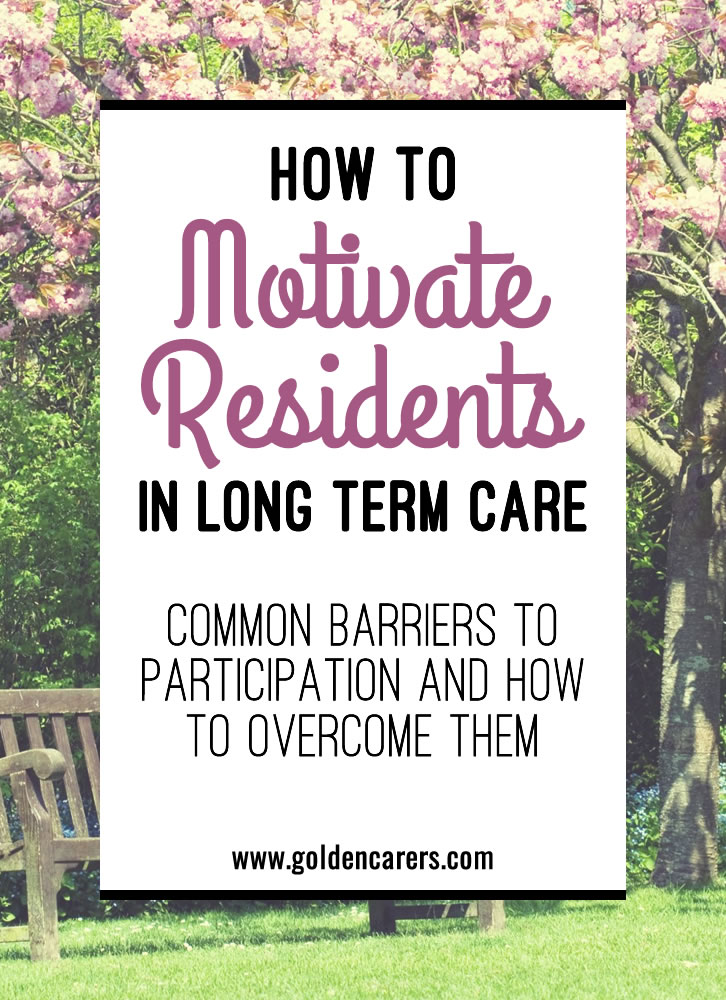
Golden Carers has 1000s of activities and resources for senior care.
Encouraging the elderly to participate in scheduled activities can be challenging. Lack of engagement is a common problem.
It can be so discouraging to put your heart and soul into planning activities only to have them ignored or dismissed by residents.
To encourage participation it is important that you identify any barriers - whether perceived or real - that might be preventing them from getting involved.
Related: 10 Ways to Increase Activity Participation
Below are some common barriers; most of them can be overcome with the right motivators.
Common Barriers to Participation
1. Language barriers
Try to engage a family member to attend a couple of sessions. Alternatively, seek a volunteer fluent in the language of the resident to visit twice a week and assist with activities.
Related:
- Tips for Communicating with English Second Language Residents
- 10 Tips for Supporting Culturally Diverse Clients
- Communication Cards for the Elderly
2. Feelings of inadequacy (too old, too sick)
Try bargaining; invite him or her to 'watch' the activities and then later encourage them to give it a go for 10 minutes.
Pair-up the resident with another who attends activities regularly and invite both to attend the next session.
3. Fear of making a fool of themselves
Mitigate this fear by:
- Inviting a guest to join them or
- Demonstrating the activity yourself
For instance when I run 'Art Therapy' sessions I always join the residents by painting with them. As I am a dreadful artist they always end up laughing at my efforts (with my full support). And then, suddenly, making an average painting is not a big deal.
Related: 10 Benefits of Coloring-In for the Elderly
4. Fear of not being able to keep up with others
Emphasise that there is no hurry; what is not finished today can be done tomorrow. Assist them with each activity until they build up confidence.
5. Lack of awareness of the benefits of activities
Ask a physiotherapist to assist you in explaining the benefits of movement through exercises, dancing and walking.
6. Maladjustment to residential care
There are no guaranties that people will settle in happily to residential care. Most do in time however some do not. Daily one-on-one visits will help you to get to know each other and build trust. Later you can start inviting them along to activities.
Related: 12 Tips for One-on-One Visits with Seniors
7. Pain and/or depression
If you think your client is in pain or depressed, inform and seek the advice of health care professionals.
8. Threatened by peers
There are many types of aggressive behaviors that can result in clients choosing not to participate in programmed activities.
Territorial aggression is one of them and can upset many people in nursing homes: 'This is my chair' or 'You don't sit at this table' for example.
One way to avoid this is by placing the name of each participant in large letters on the chair or table so nobody attempts to take the place of others.
Related: How to Respond to Concerning Behavior
9. Don't like to mix with others
Use tender loving care. If a resident doesn't like large groups then invite them along to small group sessions with three or four people.
Try to find like-minded peers; others with a similar personality and demeanour. Introduce them one by one in intervals of 3 to 4 weeks and see how you go.
Sometimes you will only manage to connect two people, but it is worth trying for a third or fourth person. Then you can introduce games and other activities suitable for small groups.
Related: 15 Activities for Loners and Introverted Seniors
Motivating the elderly is an ongoing process

Whether you are working with recent or long-term residents, they are often troubled with health problems, sometimes depressed because of loss of abilities or missing their loved ones.
However people are social creatures at heart and one of the most powerful factors in motivating residents is consistency.
Ask Residents for Help
Keep inviting residents on a regular basis; appeal to their sense of community by asking them to help you out. Ask them to help you create craft gifts for others, assist with cooking, help peers to play a game, set the table for a special garden or art session and/or sort out drawers or boxes of craft material.
These sorts of 'helping out' activities may well give residents a sense of belonging and identification.
Don't give up. Negotiate without coercion. Deep down everybody seems to enjoy cooperation and your gentle persistence will be rewarded.
Related:
- The Importance of Daily Living Activities for the Elderly
- Culture Change: A Shift Towards Person Centred Care
- 10 Ways to Increase Activity Participation
We'd love to hear your feedback. What has worked for you?
Related Activities
Comments Post a Comment
Cynthia Teffer
 3rd Sep 2021
3rd Sep 2021


 13th Jul 2019
Activity Director
13th Jul 2019
Activity Director
I say if it works use it
Thank you so much
 13th Jul 2019
Activities Director
13th Jul 2019
Activities Director
 15th Jul 2019
15th Jul 2019
 3rd Sep 2018
3rd Sep 2018
 6th Aug 2019
Recreation therapist
6th Aug 2019
Recreation therapist
With very capable residents, ask them to make suggestions and take a role in making it happen, giving them a sense of "ownership" and empowerment. List the potential resident roles and put that up in a common area asking residents to nominate if they would like to do one, or if they would like to suggest another role. Some ideas to start might be: a "roving reporter" in the home, finding/writing up snippets for the home newsletter; using a camera to take pics of flowers in the garden, birds feeding etc for a "photo of the week" noticeboard; finding a joke, poem or prayer of the week to share on noticeboards; maintaining supplies of quiz, spot the difference, or crossword sheets around the home in designated spots such as lounge areas, corridor activity stations for residents to use at any time day or night- adult colouring sheets are very popular too; dining areas often have residents who fold serviettes decoratively, vary floral arrangements on tables (silk, dried or real). Setting up one or more spaces with a large jigsaw puzzle and sign inviting people to complete has been popular in our home - one resident started and was soon joined by others and staff from time to time! An area with board games can be good for self-directed activities - from complex ones like chess, checkers, word games, to snakes and ladders - try to get one or two residents to nominate to keep the games area tidy/re-set. Do you have a computer for resident use and any residents who are computer savvy - having one show others places they'd like to see or visit using Google Earth has been popular in our facility - they don't need you there to facilitate, it can be fully self-directed - they just organise a time to be there & anyone interested joins. Depending on the interests, expertise and skills of your residents you might get a wide variety of other interesting suggestions from them! Wendy
 8th Aug 2019
Diversional Therapist
8th Aug 2019
Diversional Therapist
A part of the garden to be looked after.
A podcast that appeals to them (science, book reviews, poetry).
Contacting your local Senior Citizens Club activities.
Learning something (a language, playing the drums/Ukulele or Belly Dancing.
Joining a Choir, Mahjong/Chess, Cards group
 13th Mar 2018
Diversional Therapist
13th Mar 2018
Diversional Therapist
All the best!

 20th Jun 2017
Activities Director
20th Jun 2017
Activities Director
 30th Mar 2022
Activities Co-Ordinator
30th Mar 2022
Activities Co-Ordinator
 26th Feb 2017
26th Feb 2017
Sing Alongs
Classical
Old TIme Favorites
Oldies but Goodies
Examples such as Singing In the Rain, Que Sera, Sera, you are my Sunshine...
Alphabet
National Anthem
Lord's prayer
Spiritual Therapy Rosary , poem readings, words of Encouragement, Joke of the Day, Daily Dirt, Current Events (Good News Only) , Meteorology....

 28th Feb 2016
Diversional Therapist
28th Feb 2016
Diversional Therapist
1. Offer her a plant (vegetable or flower) to look after; buy it small so she has the satisfaction of seeing it grow.
2. Maybe a friend/neighbour /grandchild can come and play a game of cards once a week.
3. Find a podcast that interests her; science, book review, gardening, poetry.
4. Your local Botanical Gardens may run a visually impaired garden session.
5. A church based craft or sitting exercises group.
6. Drum classes are becoming very popular with the elderly.
7. Knitting and crocheting are options but if your mother is not interested she may enjoy recycling yarn by unravelling old sweaters into bowls for charity.
Best wishes, I hope the above gives you food for thought.
 1st Nov 2017
Activity Assistant
1st Nov 2017
Activity Assistant
Cheers to everyone!!!
 1st Mar 2014
Educator
1st Mar 2014
Educator

 24th Feb 2014
Diversional Therapist
24th Feb 2014
Diversional Therapist
Regards
Morena
 3rd Jan 2014
3rd Jan 2014
 30th Dec 2013
30th Dec 2013
 11th May 2012
recreation therapist
11th May 2012
recreation therapist
 8th May 2012
8th May 2012
 2nd May 2012
Diversional Therapist
2nd May 2012
Diversional Therapist
 1st May 2012
recreation therapist
1st May 2012
recreation therapist
 30th Apr 2012
Training Consultant (Operations)
30th Apr 2012
Training Consultant (Operations)
This is really useful, thank you. Does anyone have ideas or info for setting up and sustaining a men's group?
We have a development day coming up for our therapy assistants and this is a topic of interest.
Thanks,
Melissa
 29th Apr 2012
Diversional Therapist
29th Apr 2012
Diversional Therapist
 29th Apr 2012
Diversional Therapist
29th Apr 2012
Diversional Therapist


 18 Social Media Trends to Try at Your Community
18 Social Media Trends to Try at Your Community
 Mandala Activities for the Elderly
Mandala Activities for the Elderly
 15 Exercise Program Alternatives for Senior Care
15 Exercise Program Alternatives for Senior Care
 The Importance of Daily Living Activities for the Elderly
The Importance of Daily Living Activities for the Elderly


This is a tough one
I am wondering how old the client is
If she is refusing to drink, that can be a problem because dehydration can cause a lot of problems
Here are some suggestions for that
https://www.goldencarers.com/20-creative-ways-to-hydrate-the-elderly-in-senior-care/6501/
As you can see, there are many complications of this
Has the daughter ever thought about adult daycare?
How about getting a caregiver for a few hours to give her a break
Perhaps the client needs more exercise walking is always good
Is there anything that can be adapted that the client used to like to do?
Coloring Can be relaxing even if it's simple
https://www.goldencarers.com/mandala-activities-for-the-elderly/4493/
I will think more about this keep us updated
Respite care one being another option for giving the daughter a break